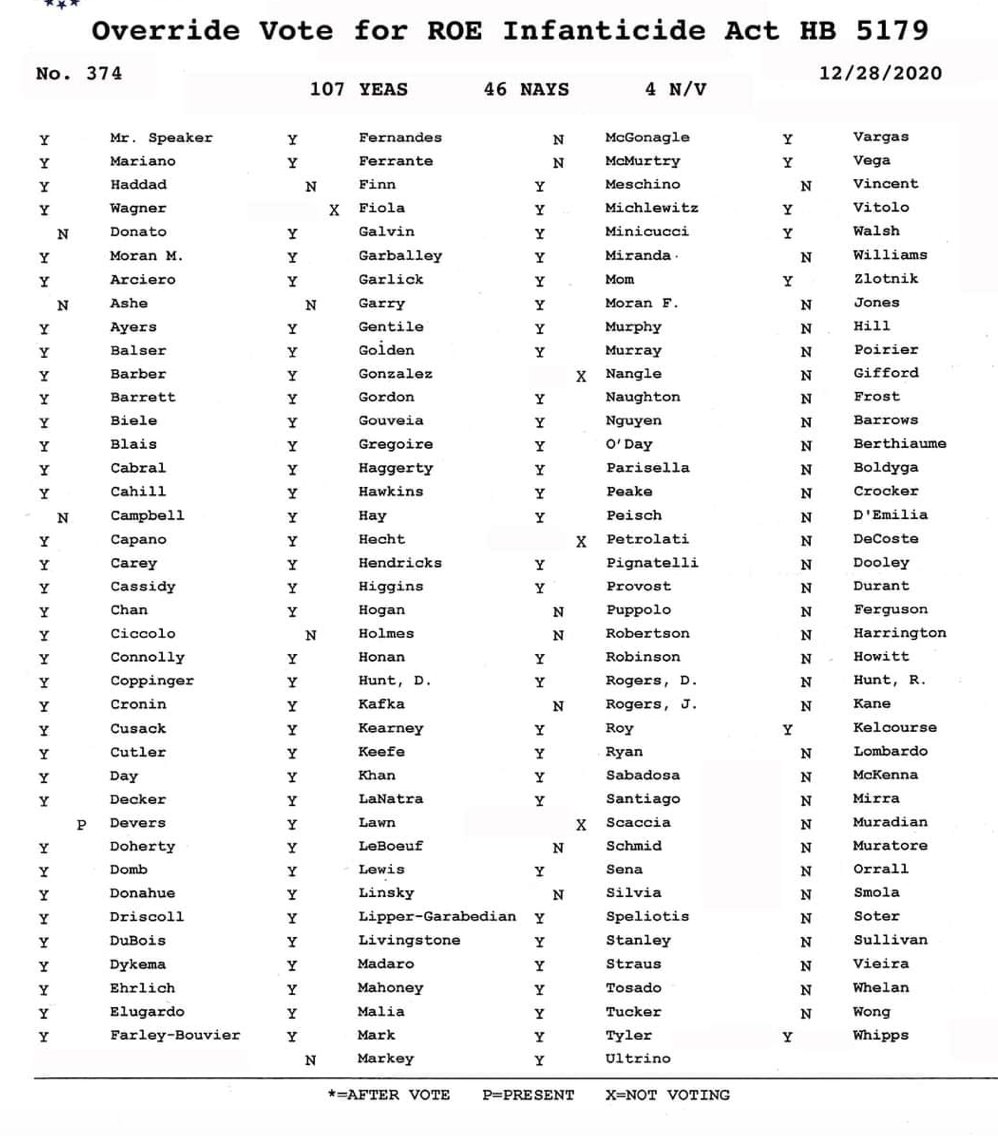Humanity Lost : The Massachusetts ROE ACT

How could we have become so cruel a people? I fear that the very essence of our humanity and decency is about to be tested and possibly extinguished soon… right here in our home state of Massachusetts if the ROE Act passes.
I have often said “all that is needed for the world to slip into complete darkness… is for men and women of goodwill to do nothing. To let current events run their course… ultimately… until all of its victims are gone… and you inevitably stand alone.”
Now… the Darkness descends.
Whether your prolife or pro choice, the proposed “ROE ACT” now sitting before our legislature, crosses the line.
This post is different from many of my other posts. It is designed as a reference tool. This proposed legislation is so extreme, I thought it important to provide a platform so that others can read and educate themselves on this Act.
I am flabbergasted that this bill, (which at its core allows Abortion til the moment of birth, legalizes Partial Birth Abortion, allows the killing of infants born alive who survive a last minute abortion attempt and eliminates a parents right to know and have a say on what is happening to their child) has progressed this far. It’s Abortion Run Wild…. Madness Incarnate!
Now, I do understand that many people have differing opinions on Abortion. The purpose of this article is not to try and persuade you one way or the other on the overall issue. I would fail if I did this. But rather… what I am going to do… is to provide you the facts on this current piece of Massachusetts Legislation, called “The ROE Act”.
It is my hope that many of the Sponsors and Co-Sponsors of this legislation have never really read the proposed bill and the cross references it cunningly deletes from current law. It is my hope, that with enormous pressure by good people like you, they will rescind their support of this EXTREME Act and passage of the ROE ACT will fail.
Below, you will have access to current abortion law, actual proposed “ROE” legislation, official links, resources and the names of all House and Senate Sponsors and Co-Sponsors.
It is my sincerest hope…. that once you read the proposed law and understand the existing laws that it abolishes… that you will step up as a decent human being… and do whatever you can to stop this Madness from passing. It’s just way too Extreme and Cruel!
Everything I state in this post is backed up, in writing, within the current and proposed laws. If it sounds absurd… it is! But it is the truth.
ROE Act Facts
(Quick Links)
- What Proposed Law Actually Does (Quick Summary)
- Background
- Name Controversy
- Comparison of Existing Abortion Law vs Proposed ROE Act
- Read the Laws and Proposed ROE Act Yourself
- If ROE Act passes, What current laws are eliminated?
- What does ROE Act Keep?
- What does ROE Act actually change?
- Read MA House of Representatives Version H.3320
- MA House of Representatives Sponsors & Co-Sponsors of ROE
- Read MA State Senate Version S.1209
- MA State Senate Sponsors & Co-Sponsors of ROE
WHAT NEW LAW DOES (Quick Summary)
This Bill is an Unrestricted Abortion Bill. It is a Bill that eliminates Parental Consent, allows legal Abortion up to the live birth and then legalizes the killing of babies who survive an Abortion attempt. It is Abortion Run Wild!
- This legislation is so extreme, so vile, that it Abolishes Lifesaving Equipment and Attempt to Save a Child Who Survives Abortion
- Allows Partial Birth Abortion
- It is an act that strips away a parent’s right to have a say in their minor child’s healthcare.
- Your child will continue to need your parental consent to have a cavity filled by a Dentist… yet in a late term surgical procedure where complication rates can be as high as 50%, parent’s will lose their rights and have no say.
- It is an act that will only advise a parent that their beloved child is either hospitalized or dead, after complications of a surgical procedure the parent’s did not even know was occurring.
- Under the “Protection of Privacy”, Medical Professionals would be prohibited from telling the parent the cause of their child’s hospitalization or death as a result of an Abortion procedure.
- Eliminates existing “Judicial Bypass” system which often catches young girls who are victims of sex trade, rape and other abuses.
- Allows the surgical procedure of Abortion after 13 weeks to no longer be done in a Hospital. Abortions could now be done in Alley clinics.
- Eliminates 24 hour waiting period for an Abortion
- Eliminates all penalties from breaking any Abortion law.
- Changes the Definition of Pregnancy
- And probably most ironic and contradictory, the Federal Healthy Start Program, designed to help new mothers and newborn infants get a healthy and safe start to life, would now allow mothers to kill the babies at taxpayer expense. How can a dead baby have a “Healthy Start” in life?
BACKGROUND
The Massachusetts House and Senate have both introduced identical bills H.3320 and S.1209 which were written by NARAL Pro-Choice Massachusetts, the Planned Parenthood Advocacy Fund of Massachusetts and the ACLU Massachusetts. The Legislation is called the “ROE Act” which stands for “An Act Removing Obstacles and Expanding access to women’s reproductive health”
I trust… that after you read this act and understand the current laws it abolishes… and the new horrors it creates… you will see beyond the “grandstanding and manipulation” of those who are pushing and financially benefiting from this legislation.
A DECEPTIVE NAME OF THE PROPOSED LAW
From the very title of the Act itself. “An Act Removing Obstacles and Expanding access to women’s reproductive health” there is deception and an attempt to manipulate you and your emotions.
First, let’s be clear… the proposed law does not attempt to help women gain better care or access to Reproductive Health Services. There is no expanded access, cost reductions or any other actions for basic, necessary women’s reproductive health issues. This is strictly an Abortion Bill.
The following Important Women Health Issues and Procedures are not even mentioned in the proposed bill:
- Mammography Screening
- Pap Smears
- Blood tests
- Menopause
- Hysterectomy
- Fertility
- Cervical Screening and Ovarian Cancer
- Sexually Transmitted Infections
- chronic health problems (such as endometriosis and polycystic ovary syndrome)
A real Women’s Healthcare Bill would have addressed the issues above and provided solutions for the affordability and access to these services for women of any age, any race, religion or socioeconomic status.
COMPARISON OF CURRENT MA ABORTION LAWS VS PROPOSED “ROE ACT”
READ THE CURRENT LAW AND ACTUAL BILLS FOR YOURSELF: OFFICIAL LINKS
- Current Massachusetts Abortion Laws: Starts at Section K thru V (Links to State of MA Law)
- H3320 MA House Official Bill ROE ACT (Download PDF)
- MA State Senate S1209 ROE Act (Official Bill) (Download PDF)
If ROE ACT Passes, what in the current law changes?
Simply stated… just about everything.
The Following Sections are Eliminated from the Current Law Entirely:
The New Proposed ROE ACT, in both and House and Senate versions, states: “SECTION 2. Said Chapter 112 of the General Laws is hereby further amended by striking out Sections 12L through 12U, inclusive”
(This means all of the below existing laws, which were previously debated and passed, are nullified and abolished.)
Section 12L. If a pregnancy has existed for less than twenty-four weeks no abortion may be performed except by a physician and only if, in the best medical judgment of a physician, the abortion is necessary under all attendant circumstances.
Section 12M. If a pregnancy has existed for twenty-four weeks or more, no abortion may be performed except by a physician and only if it is necessary to save the life of the mother, or if a continuation of her pregnancy will impose on her a substantial risk of grave impairment of her physical or mental health.
Section 12N. Any person who violates the provisions of sections twelve L or twelve M shall be punished by imprisonment for not less than one year nor more than five years. Conduct which violates the provisions of this act, which also violates any other criminal laws of the commonwealth, may be punished either under the provisions of sections 12K to 12U, inclusive, or under such other applicable criminal laws.
Section 12O. If an abortion is performed pursuant to section twelve M, no abortion procedure which is designed to destroy the life of the unborn child or injure the unborn child in its mother’s womb may be used unless, in the physician’s best medical judgment, all other available procedures would create a greater risk of death or serious bodily harm to the mother either at the time of the abortion, or subsequently as the result of a future pregnancy, than the one being used.
Section 12P. If an abortion is performed pursuant to section twelve M, the physician performing the abortion shall take all reasonable steps, both during and subsequent to the abortion, in keeping with good medical practice, consistent with the procedure being used, to preserve the life and health of the aborted child. Such steps shall include the presence of life-supporting equipment, as defined by the department of public health, in the room where the abortion is to be performed.
Section 12Q. Except in an emergency requiring immediate action, no abortion may be performed under sections twelve L or twelve M unless the written informed consent of the proper person or persons has been delivered to the physician performing the abortion as set forth in section twelve S; and if the abortion is during or after the thirteenth week of pregnancy, it is performed in a hospital duly authorized to provide facilities for general surgery.
Except in an emergency requiring immediate action, no abortion may be performed under section twelve M unless performed in a hospital duly authorized to provide facilities for obstetrical services.
Section 12R. If the physician performing the abortion is not the physician who made the medical judgment required by section twelve M, before performing the abortion he shall obtain from the physician making such judgment a written statement setting forth the exception contained in section twelve M that in his best medical judgment permits the abortion and the specified reasons why the abortion qualifies under that exception. Prior to the performance of an abortion, the physician shall make a positive determination of pregnancy, test for blood type and Rh type, test for Rho(D) sensitization on each patient found to be Rho(D) negative by use of an antiglobulin (Coombs) test performed by a blood bank operated by a licensed hospital, or by a laboratory, and offer Rho(D) immune globulin (Human) to each Rho(D) negative patient with a negative sensitization test at the time of any abortion. The physician performing the abortion shall retain this written statement as an attachment to the file copy of his report required by this section. Within thirty days after the performance of an abortion, the physician performing such abortion shall file with the commissioner of public health on a form prescribed by him the following information to the best of his knowledge: the date and place of the abortion; if he was the physician making the medical judgment required by section twelve M, the exception contained in said section that in his best medical judgment permitted the abortion and the specific reasons why the abortion qualified under that exception; if he is not the physician who made such medical judgment, the name and address of the physician from whom he received the written statement required by this section and the exception contained in said section twelve M that permitted the abortion and a verbatim recitation of the specific reasons why the abortion qualified under either exception as set forth in the written statement he received from such physician; the age of the mother; the method used to perform the abortion; whether the mother survived the abortion; the details of any morbidity observed in the mother; the gestational age of the child; the weight and crown-rump length of the child if determinable; whether the unborn child was alive when removed or expelled from the mother and if so, the steps taken to preserve its life; and the length of time the child lived after removal or expulsion from the mother. The physician performing the abortion shall retain in his files for seven years after the abortion a copy of the report to which he should attach or otherwise add the name of the mother. The original of the report filed with the commissioner shall not contain the name of the mother and shall be maintained by the commissioner as a public record. The commissioner shall prepare from these reports such statistical tables with respect to maternal health, abortion procedures, the unborn child and viability as he deems useful and shall make an annual report thereof to the general court. Nothing in this section shall be construed to limit the authority of the department of public health to require reports pursuant to sections twenty-four A and twenty-five A of chapter one hundred and eleven.
Section 12S. No physician may perform an abortion upon a pregnant woman without first obtaining her written informed consent. The commissioner of public health shall prescribe a form for physicians to use in obtaining such consent. This form shall be written in a manner designed to permit a person unfamiliar with medical terminology to understand its purpose and content, and shall include the following information: a description of the stage of development of the unborn child; the type of procedure which the physician intends to use to perform the abortion; and the possible complications associated with the use of the procedure and with the performance of the abortion itself; the availability of alternatives to abortion; and a statement that, under the law of the commonwealth, a person’s refusal to undergo an abortion does not constitute grounds for the denial of public assistance. A pregnant woman seeking an abortion shall sign the consent form described above at least twenty-four hours in advance of the time for which the abortion is scheduled, except in an emergency requiring immediate action. She shall then return it to the physician performing the abortion who shall maintain it in his files and destroy it seven years after the date upon which the abortion is performed.
The said consent form and any other forms, transcript of evidence, or written findings and conclusions of a court, shall be confidential and may not be released to any person except by the pregnant woman’s written informed consent or by a proper judicial order, other than to the pregnant woman herself, to whom such documents relate, the operating physician, or any person whose consent is required pursuant to this section, or under the law. If a pregnant woman is less than eighteen years of age and has not married, a physician shall not perform an abortion upon her unless he first obtains both the consent of the pregnant woman and that of her parents, except as hereinafter provided. In deciding whether to grant such consent, a pregnant woman’s parents shall consider only their child’s best interests. If one of the pregnant woman’s parents has died or is unavailable to the physician within a reasonable time and in a reasonable manner, consent of the remaining parent shall be sufficient. If both parents have died or are otherwise unavailable to the physician within a reasonable time and in a reasonable manner, consent of the pregnant woman’s guardian or guardians shall be sufficient. If the pregnant woman’s parents are divorced, consent of the parent having custody shall be sufficient. If a pregnant woman less than eighteen years of age has not married and if one or both of her parents or guardians refuse to consent to the performance of an abortion, or if she elects not to seek the consent of one or both of her parents or guardians, a judge of the superior court department of the trial court shall, upon petition, or motion, and after an appropriate hearing, authorize a physician to perform the abortion if said judge determines that the pregnant woman is mature and capable of giving informed consent to the proposed abortion or, if said judge determines that she is not mature, that the performance of an abortion upon her would be in her best interests. A pregnant woman less than eighteen years of age may participate in proceedings in the superior court department of the trial court on her own behalf, and the court may appoint a guardian ad litem for her. The court shall, however, advise her that she has a right to court appointed counsel, and shall, upon her request, provide her with such counsel. Proceedings in the superior court department of the trial court under this section shall be confidential and shall be given such precedence over other pending matters that the court may reach a decision promptly and without delay so as to serve the best interests of the pregnant woman. A judge of the superior court department of the trial court who conducts proceedings under this section shall make in writing specific factual findings and legal conclusions supporting his decision and shall order a record of the evidence to be maintained including his own findings and conclusions.
Nothing in this section is intended to abolish or limit any common law rights of persons other than those whose rights it governs for the purpose of any civil action or any action for injunctive relief under section twelve U.
Section 12T. Any person who commits an act in violation of sections twelve O or twelve P shall be punished by a fine of not less than five hundred dollars nor more than two thousand dollars, or by imprisonment of not less than three months nor more than five years, or by both said fine and imprisonment. Conduct which violates sections twelve O or twelve P which also violates any other criminal laws of the commonwealth, may be punished either under this section or under such other applicable criminal laws. Any person who willfully violates the provisions of section twelve Q or twelve R shall be punished by a fine of not less than one hundred dollars nor more than two thousand dollars.
Section 12U. The attorney general or any person whose consent is required either pursuant to section twelve S or under common law, may petition the superior court for an order enjoining the performance of any abortion that may be performed contrary to the provisions of sections twelve L to twelve T, inclusive.
What Does the ROE Act Keep?
It Only Keeps this Existing Section:
Section 12V. Any person who, in good faith, attempts to render emergency care including, but not limited to, cardiopulmonary resuscitation or defibrillation, and does so without compensation, shall not be liable for acts or omissions, other than gross negligence or willful or wanton misconduct, resulting from the attempt to render such emergency care.
What Does the ROE Act Change or Add?
Attempts to Change the legal Definition of Abortion and Pregnancy.
The ROE Act attempts to redefine what an abortion is by removing the words “unborn child” and “mother” from the current legal definitions of pregnancy and abortion. (Despite the fact that a fetus has 100% unique Human DNA and only a women can get pregnant)
ROE Proponents state the current definitions are inflammatory and the Fetus is not human, thus it is not an unborn child… and it’s not a mother’s uterus, but rather a person’s uterus.
Eliminates all Penalties for violation of any of the Abortion laws.
The new Law eliminates any and all penalties for any violations of this law. Anyone can break the new law and suffer no consequences. Abortionists, such as Kermit Gosnell, would no longer be held accountable for the quality of healthcare nor the crimes they commit.
READ THE CURRENT LAW AND ACTUAL BILLS FOR YOURSELF: OFFICIAL LINKS
- Current Massachusetts Abortion Laws: Starts at Section K thru V (Links to State of MA Law)
- H3320 MA House Official Bill ROE ACT (Download PDF)
- MA State Senate S1209 ROE Act (Official Bill) (Download PDF)
Massachusetts House Bill: House of Representatives
Bill H.3320
SECTION 1. Chapter 112 of the General Laws is hereby amended by striking out section 12K, as appearing in the 2016 Official Edition, and inserting in place thereof the following section:
Section 12K. As used in section twelve L to section twelve U, inclusive, the following words shall have the following meanings:
Abortion, any medical treatment intended to induce the termination of a clinically diagnosable pregnancy except for the purpose of producing a live birth. The term abortion does not include miscarriage management.
Hospital, a hospital as defined in section fifty-two of chapter one hundred and eleven of the General Laws, and duly licensed under the provisions of section fifty-one of chapter one hundred and eleven of the General Laws.
Physician, an individual lawfully authorized to practice medicine within the Commonwealth.
Pregnancy, means the presence of an implanted human embryo or fetus within a person’s uterus.
SECTION 2. Said Chapter 112 of the General Laws is hereby further amended by striking out Sections 12L through 12U, inclusive, as so appearing, and inserting in place thereof the following sections:
Section 12L. The Commonwealth shall not interfere with a person’s personal decision and ability to prevent, commence, terminate, or continue their own pregnancy consistent with this chapter. The Commonwealth shall not restrict the use of medically appropriate methods of abortion or the manner in which medically appropriate abortion is provided.
Section 12M. A physician, acting within their lawful scope of practice, may perform an abortion when, according to the physician’s best medical judgment, the patient is within twenty-four weeks from the commencement of pregnancy, as defined in section 12K of this chapter. A physician, acting within their lawful scope of practice, may perform an abortion when, according to the physician’s best medical judgment based on the facts of the patient’s case, the patient is beyond twenty-four weeks from the commencement of pregnancy and the abortion is necessary to protect the patient’s life or physical or mental health, in cases of lethal fetal anomalies, or where the fetus is incompatible with sustained life outside the uterus. Medical judgment may be exercised in the light of all factors—physical, emotional, psychological, familial, and the person’s age—relevant to the well-being of the patient.
12N. Prior to performing an abortion, a physician shall obtain the pregnant patient’s written informed consent on a form prescribed by the Commissioner of Public Health. A pregnant person seeking an abortion shall sign the consent form before the abortion is performed, except in an emergency requiring immediate action. The consent form and any other forms shall be confidential and may not be released to any person other than to the pregnant person to whom such documents relate or the operating physician, except by the pregnant patient’s written consent; provided, however, that this requirement shall not impose any waiting period between the signing of the consent form and the performance of the abortion.
12O. The department of public health shall have the authority to require aggregate reports regarding induced termination of pregnancy pursuant to sections twenty-four A and twenty-five A of chapter one hundred and eleven.
SECTION 3. Section 12F of Chapter 112 of the General Laws, as so appearing, is hereby amended by striking out, in line XXX, the words “abortion or”.
SECTION 4. Section 10E of Chapter 118E of the General Laws, as so appearing, is hereby amended by striking out, in lines XX, clause (i) and inserting in place thereof the following clause:-
(i) all medically necessary care relative to pregnancy, including but not limited to abortion, care to maintain health during the course of the pregnancy and delivery, and newborn hospital care;
H3320 Sponsors/Co-Sponsors
Massachusetts Senate Bill: Massachusetts State Senate
Bill S.1209
SECTION 1. Chapter 112 of the General Laws is hereby amended by striking out section 12K, as appearing in the 2016 Official Edition, and inserting in place thereof the following section:
Section 12K. As used in section twelve L to section twelve U, inclusive, the following words shall have the following meanings:
Abortion, any medical treatment intended to induce the termination of a clinically diagnosable pregnancy except for the purpose of producing a live birth. The term abortion does not include miscarriage management.
Hospital, a hospital as defined in section fifty-two of chapter one hundred and eleven of the General Laws, and duly licensed under the provisions of section fifty-one of chapter one hundred and eleven of the General Laws.
Physician, an individual lawfully authorized to practice medicine within the Commonwealth.
Pregnancy means the presence of an implanted human embryo or fetus within a person’s uterus.
SECTION 2. Said Chapter 112 of the General Laws is hereby further amended by striking out Sections 12L through 12U, inclusive, as so appearing, and inserting in place thereof the following sections:
Section 12L. The Commonwealth shall not interfere with a person’s personal decision and ability to prevent, commence, terminate, or continue their own pregnancy consistent with this chapter. The Commonwealth shall not restrict the use of medically appropriate methods of abortion or the manner in which medically appropriate abortion is provided.
Section 12M. A physician, acting within their lawful scope of practice, may perform an abortion when, according to the physician’s best medical judgment, the patient is within twenty-four weeks from the commencement of pregnancy, as defined in section 12K of this chapter. A physician, acting within their lawful scope of practice, may perform an abortion when, according to the physician’s best medical judgment based on the facts of the patient’s case, the patient is beyond twenty-four weeks from the commencement of pregnancy and the abortion is necessary to protect the patient’s life or physical or mental health, or in cases of lethal fetal anomalies, or where the fetus is incompatible with sustained life outside the uterus. Medical judgment may be exercised in the light of all factors—physical, emotional, psychological, familial, and the person’s age—relevant to the well-being of the patient.
12N. Prior to performing an abortion, a physician shall obtain the pregnant patient’s written informed consent on a form prescribed by the Commissioner of Public Health. A pregnant person seeking an abortion shall sign the consent form before the abortion is performed, except in an emergency requiring immediate action. The consent form and any other forms shall be confidential and may not be released to any person other than to the pregnant person to whom such documents relate or the operating physician, except by the pregnant patient’s written consent; provided, however, that this requirement shall not impose any waiting period between the signing of the consent form and the performance of the abortion.
12O. The department of public health shall have the authority to require aggregate reports regarding induced termination of pregnancy pursuant to sections twenty-four A and twenty-five A of chapter one hundred and eleven.
SECTION 3. Section 12F of Chapter 112 of the General Laws, as so appearing, is hereby amended by striking out, in line 20, the words “abortion or”.
SECTION 4. Section 10E of Chapter 118E of the General Laws, as so appearing, is hereby amended by striking out, in lines 17 to 19, inclusive, clause (i) and inserting in place thereof the following clause:-
(i) all medically necessary care relative to pregnancy, including but not limited to abortion, care to maintain health during the course of the pregnancy and delivery, and newborn hospital care;
S.1209 State Senate Sponsors/Co-Sponsors
| Name | District/Address |
|---|---|
| Harriette L. Chandler | First Worcester |
| Michael J. Barrett | Third Middlesex |
| James T. Welch | Hampden |
| Rebecca L. Rausch | Norfolk, Bristol and Middlesex |
| Patricia A. Haddad | 5th Bristol |
| Jay D. Livingstone | 8th Suffolk |
| Mike Connolly | 26th Middlesex |
| William N. Brownsberger | Second Suffolk and Middlesex |
| Tami L. Gouveia | 14th Middlesex |
| Julian Cyr | Cape and Islands |
| Jack Patrick Lewis | 7th Middlesex |
| Lindsay N. Sabadosa | 1st Hampshire |
| Paul R. Feeney | Bristol and Norfolk |
| David Paul Linsky | 5th Middlesex |
| Jason M. Lewis | Fifth Middlesex |
| Lori A. Ehrlich | 8th Essex |
| Carlos González | 10th Hampden |
| Cindy F. Friedman | Fourth Middlesex |
| Ruth B. Balser | 12th Middlesex |
| Dylan A. Fernandes | Barnstable, Dukes and Nantucket |
| Kay Khan | 11th Middlesex |
| Jennifer E. Benson | 37th Middlesex |
| Joanne M. Comerford | Hampshire, Franklin and Worcester |
| Cynthia Stone Creem | First Middlesex and Norfolk |
| Marjorie C. Decker | 25th Middlesex |
| Sal N. DiDomenico | Middlesex and Suffolk |
| James B. Eldridge | Middlesex and Worcester |
| Nika C. Elugardo | 15th Suffolk |
| Patricia D. Jehlen | Second Middlesex |
| Mary S. Keefe | 15th Worcester |
| John J. Lawn, Jr. | 10th Middlesex |
| David Henry Argosky LeBoeuf | 17th Worcester |
| Joan B. Lovely | Second Essex |
| Tram T. Nguyen | 18th Essex |
| José F. Tosado | 9th Hampden |
| Maria Duaime Robinson | 6th Middlesex |
| Sean Garballey | 23rd Middlesex |
| Thomas M. Stanley | 9th Middlesex |
| Michael O. Moore | Second Worcester |
| Brendan P. Crighton | Third Essex |
| Adam G. Hinds | Berkshire, Hampshire, Franklin and Hampden |
| Danielle W. Gregoire | 4th Middlesex |
| Joseph A. Boncore | First Suffolk and Middlesex |
| Daniel J. Hunt | 13th Suffolk |
| Denise Provost | 27th Middlesex |
| Barry R. Finegold | Second Essex and Middlesex |
| Smitty Pignatelli | 4th Berkshire |
| Eric P. Lesser | First Hampden and Hampshire |
| James K. Hawkins | 2nd Bristol |
| Harold P. Naughton, Jr. | 12th Worcester |
| Patrick Joseph Kearney | 4th Plymouth |
| Christina A. Minicucci | 14th Essex |
If the ROE Act passes, women’s health would be dramatically jeopardized by lowering the age of the abortion to 10 or 11 years old and increasing abortion availability to moment of birth. With Abortion complication rates exceeding 50% after the 2nd Trimester, How does this improve women’s health care?
According to US Government National Institutes of Health, Updated Nov 2018
The total abortion-related complication rate including all sources of care including emergency departments and the original abortion facility is estimated to be about 2%.
The incidence of abortion-related emergency department visits within six weeks of initial abortion procedure is about 40%.
Complications based on gestational age are as follows:
- Eight weeks and under – Less than 1%
- 8-12 weeks – 1.5-2%
- 12-13 weeks – 3-6%
- 2nd trimester – Up to 50%
- Top Complications from Abortion:
- Hemorrhage
- Sepsis
- Peritonitis
- Deep vein thrombosis
Here is the House and Senate Roll Call that allowed ROE to Pass.






